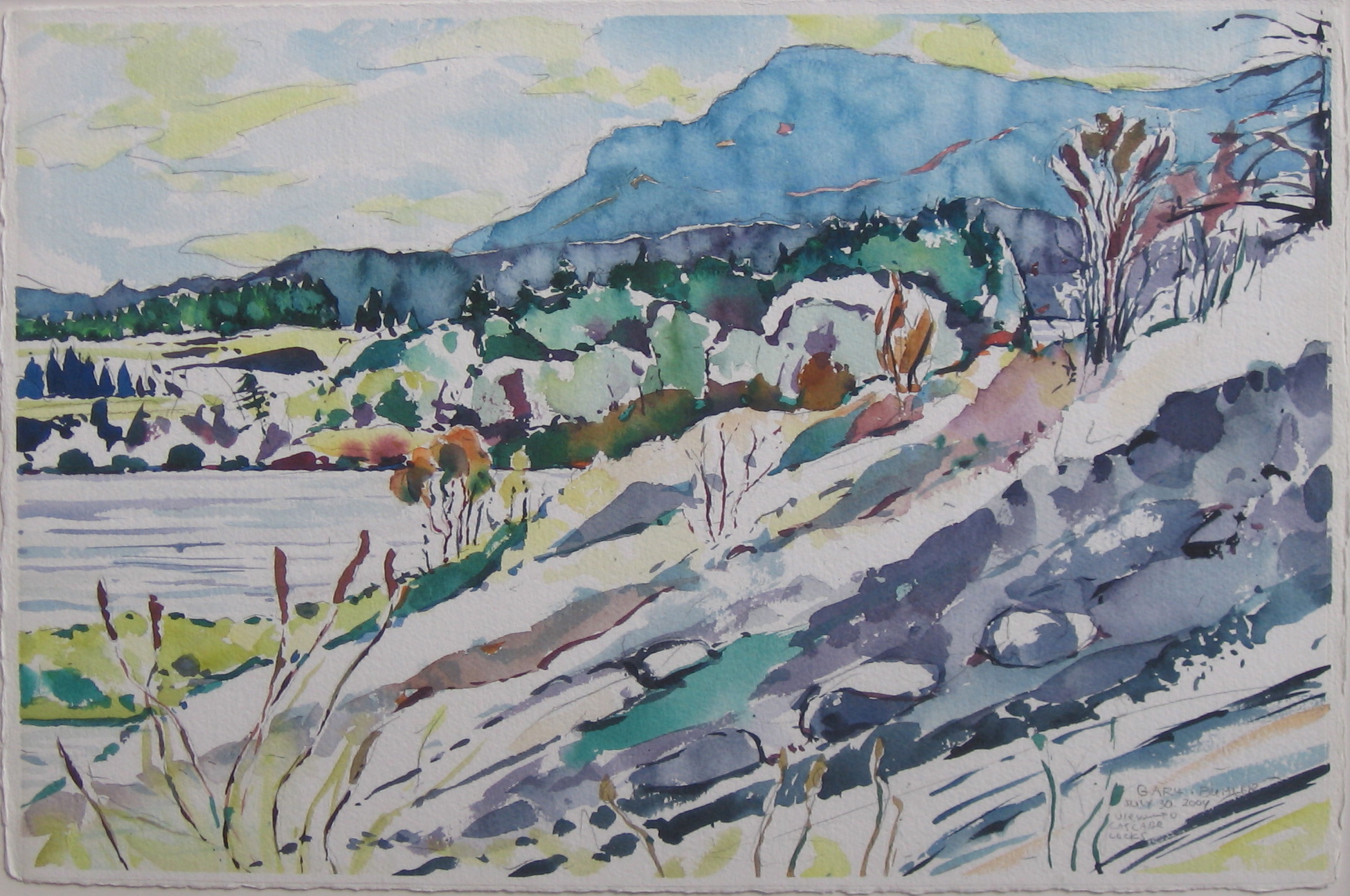 View of Cascade Locks, 15X22, watercolor, Gary Buhler
View of Cascade Locks, 15X22, watercolor, Gary Buhler
Audio for “Among the Furrows,” Liz N. Clift
Among the Furrows
We worked compacted gray soil between our fingers,
tried to fluff it so the lettuce and carrots, the tomatoes
and basil wouldn’t grow four inches tall only to turn blue
and die. We sent the chickens, and later the eunuch goat over
next year’s fields, tossed them kitchen scraps and followed behind,
turning the old tobacco fields under with hand-me-down hula hoes.
He begged the fields to hold moisture, sat in the middle
of the farm on cloudless summer nights, hand-watering tufts of radishes
and leggy cucumber, as I sat on the porch, wearing the day’s work
in streaks across my brow and up my arms, and listened to him sob.
We alternated nights—and by nights, I mean months—of fists beating soil
under starlight, of getting drunk on homemade blackberry wine, of going out
to the butternut patch on the pretense of weeding or harvesting, of working
dawn to dusk, or later, to till under manure and nurse meat
onto the inevitable triplet goat. Of making winter dinner
of last year’s meager pickings and barters at the farmer’s market,
canned and put up. By our third year, I knew he’d convinced himself
he loved the woman who ran the food co-op, a fairy nymph
with hair the maroon of sugar beets.
For another year, we pretended to make
a go of the farm, and each other, but then he missed the kidding over Christmas
to spend it in the Hamptons with her. And then he skipped the day I took seedlings
from the basement, tucked them into moist black soil, that teemed
with bacteria I could smell—the aroma of the world just as it begins to rain.
After he left, I wondered how I’d build a rabbit hutch
myself. It only took half a day instead of the usual two. I became more
efficient because there was no morning coffee routine, or sleeping in to have sex,
no one telling me to come eat lunch or how best to plant potatoes.
No discussion over who’d replace the rotted bottom step. And I wonder if he’ll return
for the mongrel dog he found last time he worked construction
a hundred miles from here. Some evenings, I sit on the porch drinking whiskey
or lemonade, eating homemade bread and crockpot beans, and listen
for the barn owl that lives in the river shack, whose call reminds me
of when I tried to learn violin. For the hum of cicada. For the dog
on the scent of raccoon or possum or, worse skunk. For the cottonwood
whispering secrets. For the rumble of his truck. I didn’t make him lonely enough.
____________
Liz N. Clift
Review by Ed Wickliffe
This poem is a gem of a short story. Full of detail and authenticity, the story pulls us with description more than action. This fact could be a weakness to some readers, but, given the reminiscent tone of the poem, such detail becomes its own reason for being, and a true delight to read.
Superficially this might be a confessional poem, too, a first-person, curative baring of the soul. But that is not its real focus. Its sense of struggle, loss, self-blame, and loneliness is far superior to the angst of confessional poems. This is no poem of angst, but a calm reality shared by the author, the depth of which can be briefly and tantalizingly felt by the reader.
As one reader who considers form, I might say that Among the Furrows seems a condensed short story or a prose poem as much as it is a columnar poem. This is a small point, as I think the poem overall is fine. To explain, the lines of the poem begin with a suggestion of free-verse, accentual lines—that is, with a possible pattern and potential rhythm. Then the lines become narrative, longer, and end mostly in the sensible breaks of prose thoughts. Yet there is a Whitman-esque echo here in its lines of six, seven, and eight counts, and there is no rule against columnar line breaks in prose-sounding works.
In the end this poem is an absorbing, touching, and meaningful read in any form. Enthusiastic thumbs up for Among the Furrows. It drew me in and kept me there for reading after reading.
